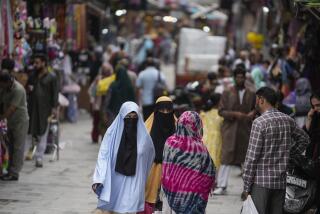Cambodian Voters Have Just One Agenda: Peace
- Share via
PHNOM PENH, Cambodia — The hapless Cambodian people for three decades have been betrayed time and again by their leaders. They are promised democracy and peace. They vote at great personal risk. They see their hopes evaporate in bloody power struggles.
On Sunday, they are being asked for one more act of faith, in yet another election under international supervision. This time it may be Cambodia’s last chance: A last chance for democracy and a last chance to salvage the reputation of a country torn asunder by genocide, war and political rivalries.
“Clearly, the international community is getting a case of Cambodian fatigue,”’ one United Nations official said. “If they can’t pull off an election that is fair and free, everyone’s prepared to wash his hands of Cambodia. I think people would just go home and say, ‘That’s it. We tried.’ ”
The cast of key characters this time hasn’t changed from the 1993 election that offered so much hope: a prince riding on the coattails of his father, the king; a former Khmer Rouge commander who says he’s just “a sentimental songwriter, not a monster”; and an economist who promises to throw out immigrant yuon--a racial slur used to describe the Vietnamese.
Although results won’t be known until about a week after the ballots are collected from 11,500 polling stations, Cambodia’s current strongman, “songwriter” Hun Sen, appears in position, if the election is fair, to legitimize the power he grabbed a year ago by overthrowing Prince Norodom Ranariddh in a coup that terrorized Phnom Penh and cost Cambodia dearly.
Foreign investment dried up in the aftermath of the coup, which negated the 1993 election and the United Nations’ $2-billion effort to bring democracy to the once-great Khmer Empire. The tourist industry died. Most donor nations cut off all but humanitarian aide. Cambodia’s membership in the Assn. of Southeast Asian Nations was put on hold, and its U.N. seat was declared vacant.
So what is at stake Sunday--and in the following 60 days when a government is formed--is nothing less than Cambodia’s survival. Candidates of the 39 parties running have many agendas; the dispirited people have only one: peace.
“We are a people whose soul has been destroyed,” said a senior human rights activist. “We no longer trust each other, the notion of Cambodia being a nation no longer exists--you can commit a crime and have complete impunity.”
Indeed, no one has been brought to answer for killing about 100 key Ranariddh supporters after the coup. Nor has a single person ever stood trial for the Khmer Rouge genocide from 1975 to 1979 that claimed more than 1 million lives.
Human rights groups cite so many examples of voter intimidation that they say the election process already is flawed.
“It is mathematically impossible for Hun Sen to lose,” said one activist, because his Cambodian People’s Party, or CPP, controls the electoral apparatus: the media, the military, the National Election Committee and the Constitutional Council. Many registered voters say they have been promised gifts and money for agreeing to cooperate with the CPP; if they refuse, they are told, their security can not be assured.
However much doubt hangs over the election, even critics agree that Cambodia has made progress in the past year. Ranariddh returned from exile in Thailand and is drawing large crowds as he casts himself in the image of King Norodom Sihanouk. Former finance minister Sam Rainsy is free to bait the Vietnamese and call for an end to corruption. Hun Sen promises to forgo his dictatorial instincts and surrender power if rejected by the voters. Political rallies have been spirited, and freedom of expression and assembly has not been seriously impaired.
Encouraging signs. Yet the Cambodians have been promised democracy so often that most voters are confused over what exactly democracy is meant to do. The late Pol Pot’s murderous Khmer Rouge guerrillas talked about democracy. The 1993 election was held in the name of democracy. Sunday’s is, too. Hun Sen and Ranariddh’s generals fought in the streets of Phnom Penh under the banner of democracy. And nothing ever changed.
The agreement that brought Ranariddh back from Thailand and set the stage for another attempt at stability and democracy was brokered by Japan, which, along with the European Union, is underwriting the $26-million cost of the election. Hundreds of international observers, including nearly 500 from the EU and a U.S. delegation, led by James R. Lilley, former ambassador to China, and former U.S. Rep. Stephen J. Solarz (D-N.Y.), will monitor the polls.
More to Read
Sign up for Essential California
The most important California stories and recommendations in your inbox every morning.
You may occasionally receive promotional content from the Los Angeles Times.













